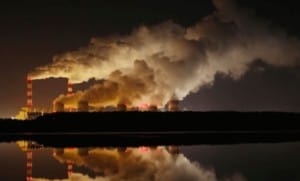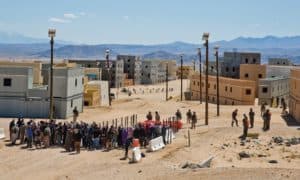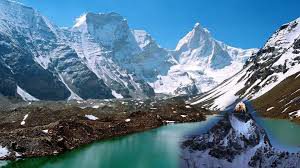Thursday, December 20th, 2018
Stephan: In my opinion, the Republican Party is the most dangerous organization in the country, particularly the men and women elected to office under that party flag. Here is one of the reasons I say that. You cannot vote Republican and be an ethical person because the positions of the party and the policies it espouses, are detrimental to the health and wellbeing of the people of the United States.

Credit: Screenshot / YouTube
“Climate change is the defining issue of our time,” U.N. Secretary-General Antonio Guterres declared in September. In October, a report from the Intergovernmental Panel on Climate Change, a U.N.-convened group, described “a world of worsening food shortages and wildfires, and a mass die-off of coral reefs as soon as 2040,” according to The New York Times. And in a new NBC/Wall Street Journal poll, Americans are beginning to heed these warnings, with 66 percent of respondents saying there is enough evidence to convince them that action is needed, up from 51 percent in 1998. Forty-five percent of them believe that action should taken immediately.
Among the 66 percent of concerned respondents are Democrats and independents. Notably missing in the growing consensus on climate change are significant numbers of Republicans.
As CNBC reports, “A 56 percent majority of the GOP says either that concern about climate change is unwarranted or that more research is necessary before taking action.” Only 15 percent of Republicans believe immediate action is needed, the same percentage of […]
No Comments
Thursday, December 20th, 2018
C.J. Polychroniou, Political Economist - truthout
Stephan: The United States' obsession with greed and profit above all other social values is literally destroying our social wellbeing. Am I alone in thinking this? Far from it. More and more I am seeing commentary from economists recognizing this truth. Here is an example from a well-known political economist.

Credit: Wholly Macro, Cafe Racer, Jirsak/Shutterstock
Is capitalism on the brink of joining the dustbin of history? And what would a post-capitalist society and a sustainable economy look like?
Since the onset of the Industrial Revolution, the world has experienced historically unprecedented levels of growth, with capitalism raising the standard of living of many nations. At the same time, capitalism has generated immense contradictions (exploitation of labor and nature, huge economic inequalities and gross social injustices), and these traditionally have been the main foci of radical political movements advancing the vision of a just socioeconomic order. But is the era of capitalist growth now coming to an end?
Renowned economist James Boyce, senior fellow at the Political Economy Research Institute at the University of Massachusetts, Amherst, offers critical insights on all of these questions, which should be food for thought for all progressives in the age of the revival of democratic socialism. Professor Boyce is the author of the forthcoming books Economics for People and the Planet: Inequality in the Era of Climate […]
1 Comment
Thursday, December 20th, 2018
Lyle Jeremy Rubin, - The Guardian (U.K.)
Stephan: The endless war in which America has been engaged for almost three decades rarely gets much media coverage, the current coverage on Trump's madness about Syria being a rare counter-example. It is quite different than the Viet Nam war which dominated the news day after day.
How is this present silence possible? The answer I think is that the Viet Nam war was a conscription war, in which the draft spread awareness of the war across the population whereas the Endless War is being conducted in an era of all-volunteer armed forces in which only about one per cent of the American population is involved. As a result, we don't have much conversation about what the war experience is like for the men and women who are embroiled in it. My own view is that we ought to be having a lot of conversation about what is going on, and here is a place to start.

Credit: Training exercises in a replica town at the US Marine Corps base in Twentynine Palms, California. Photograph: AB Forces News/Alamy
My first and only war tour took place in Afghanistan in 2010. I was a US Marine lieutenant then, a signals intelligence officer tasked with leading a platoon-size element of 80 to 90 men, spread across an area of operations the size of my home state of Connecticut, in the interception and exploitation of enemy communications. That was the official job description, anyway. The year-long reality consisted of a tangle of rearguard management and frontline supervision.
Years before Helmand province, Afghanistan, however, there was Twentynine Palms, California. From the summer of 2006 to the summer of 2007, I was trained as a lance corporal in my military occupational specialty of tactical data systems administration (a specialty I would later jettison after earning my officer commission in 2008). My schoolhouse was the Marine Corps Communication-Electronics School, which was abbreviated as MCCES, pronounced “mick-sess”. For many, the wider location […]
1 Comment
Wednesday, December 19th, 2018
Kelsey Misbrener, - Solar Power World
Stephan: Here is some good news. In states with Democratic governance, they are finally beginning to take climate change seriously, New York being one example. As the year go by those states that have taken climate change to heart early are going to prosper and those states that have not done so will become less and less desirable as places to live.

New York city
Governor Cuomo announced as part of his 2019 legislative priorities that New York will transition to carbon-free electricity by 2040. This beats California’s carbon-free deadlineby five years.
According to the Alliance for Clean Energy New York, Cuomo even referred to the plan as the Green New Deal, a progressive climate change initiative in Congress led by Representative Alexandria Ocasio-Cortez.
In response to this announcement, Vote Solar’s senior director for the Northeast, Sean Garren, issued the following statement:
“Governor Cuomo’s commitment to moving New York to 100% carbon-free electricity by 2040 will lead the Empire State and the nation toward a future with healthy communities, a safe climate, and a strong clean energy economy. The Governor’s leadership is critical as President Trump does his best to hold our country back on climate change and undermine the hundreds of thousands of jobs in our booming clean energy economy.
“This new commitment is powerful, and we need a good near-term plan for achieving it. We must make immediate progress to help families struggling to pay their bills, communities desperate for clean […]
No Comments
Wednesday, December 19th, 2018
Laura Arenschield, - EurekAlert/Ohio State University
Stephan: Twelve years ago I wrote a research paper making the point that the collapse of the hydrology of the Himalayas and Andeas was going to result, particularly in the Himalayas, in massive social disruption and migration. At the time several people wrote me saying I was being alarmist. As it happens I was right. Here's the story.

Himalayas
Climate change could have devastating effects on vulnerable residents in the Andes mountains and the Tibetan plateau, according to researchers at The Ohio State University who have been studying glaciers in those areas for decades.
Their findings–that glaciers in both parts of the world are melting more rapidly than at any point in the last 10,000 years–mean the water supply in parts of Peru, Pakistan, China, India and Nepal will decline, soon.
“Supply is down. But demand is up because of growing populations,” said Lonnie Thompson, a climate scientist at Ohio State’s Byrd Polar and Climate Research Center. “By 2100, the best case scenario is that half of the ice will disappear. Worst-case scenario: two-thirds of it will. And you’ve got all those people depending on the glacier for water.”
Thompson, a distinguished university professor of earth sciences at Ohio State, presented the team’s findings on Dec. 14 at the annual meeting of the American Geophysical Union in Washington, D.C.
Thompson has been studying and documenting the effects of climate change on glaciers in Peru for more than 40 […]
1 Comment















